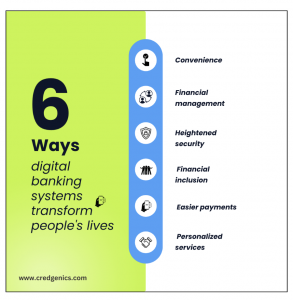As the financial services ecosystem rapidly evolves, digital banking systems have become a huge enabler in shaping the way consumers interact with money and the service provider financial institutions. These technological advancements have ushered in a modern era where brick-and-mortar banks are no longer the sole custodians of financial services. Instead, digital banking systems have democratized finance, placing unprecedented power and convenience in the hands of consumers. This paradigm shift has completely changed how people manage their finances, making it easier and more efficient than ever for them to transact, access financial data, and make wise decisions.
In this blog, we will delve into the numerous ways in which digital banking systems have reshaped people’s lives, ushering in a new era of financial empowerment and convenience.
1. Convenience redefined:
Digital banking has rewritten the rules of convenience for consumers in personal finance. Gone are the days of adhering to restrictive branch hours or travelling to physical locations. With a smartphone or computer and a reliable internet connection, individuals now enjoy round-the-clock access to their financial needs. Checking balances, transferring funds, paying bills, and conducting various transactions can be accomplished anytime, anywhere, making financial management faster, simpler and more cost effective.
2. Streamlined financial management:
Digital banking platforms offer a range of tools and features that simplify financial management for both consumers and banks. Users can effortlessly categorize expenses, set customized budgets, and receive real-time notifications for every transaction. These capabilities empower individuals to gain better control over their finances, enabling them to make informed decisions and plan for their financial future with ease.
3. Fortified security measures:
Security is a fundamental component of the ever-evolving digital banking landscape, underpinning the trust and confidence users place in these innovative financial systems. The importance of security cannot be overstated, given the vast amount of sensitive financial information traversing digital channels daily. To fortify this critical aspect, digital banking platforms use a sophisticated mix of security measures that collectively serve as a formidable defense against potential threats. Encryption, multi-factor authentication, and biometric verification methods are some of the techniques that are gaining importance in terms of security at banks and financial institutions.
4. Driving financial inclusion:
Digital banking has empowered the initiatives and actions on financial inclusion. It has effectively dismantled the geographical and infrastructural barriers that once hindered access to banking services, offering a lifeline to individuals residing in remote or underserved areas. These individuals, who were previously excluded from the formal financial system, now have the opportunity to participate in the financial services ecosystem through digital banking channels. One of the most significant achievements of digital banking is its ability to facilitate the opening of bank accounts for previously unbanked or underbanked populations. In many cases, all that’s required is a smartphone or basic internet access, enabling individuals to set up accounts and gain access to the array of financial services. This newfound access to banking services allows people to securely store their money, receive payments, and save for the future, ultimately helping them achieve financial stability.
Moreover, digital banking extends beyond basic account access. It empowers users with the ability to access credit facilities, a vital aspect of financial inclusion. Through digital platforms, individuals can apply for loans or credit products, which are often tailored to their unique needs and financial capabilities. This not only provides them with the requisite financial resources but also supports economic growth by supporting small businesses and entrepreneurial efforts in the underserved regions.
5. Quick and seamless payments:
Digital banking systems have simplified and speeded up the payment processes. User-friendly digital interfaces have become popular in place of time-consuming physical checks and trips to payment locations in traditional bill payment methods. Users can effortlessly settle their bills by logging into their digital banking accounts, entering payment details, and authorizing transactions with a few clicks or taps. This level of convenience not only saves time but also eliminates the need for manual paperwork and reduces the risk of late payments, incurring penalties, or missing due dates.
The digital banking landscape has witnessed the proliferation of digital wallets and peer-to-peer payment applications. These tools have helped individuals split the bills or send money to friends and family. Instead of dealing with cash or complicated bank transfers, users can simply open their digital wallets or payment apps, enter the recipient’s information, and transfer funds instantly. Whether it’s sharing expenses for a dinner outing, reimbursing a friend, or sending a gift, these applications have made financial transactions among individuals quicker, more efficient, and hassle-free, enhancing the overall user experience in the digital banking realm.
6. Personalized Financial Services:
The integration of data analytics and artificial intelligence has facilitated the rise of personalized financial services. Digital banking platforms analyze user data to offer tailor-made financial recommendations. From insights into spending patterns to investment opportunities, these personalized insights guide individuals in making informed financial decisions, thus enriching their financial well-being.

Conclusion
Digital banking systems have significantly contributed to transforming people’s lives by making day-to-day banking services more convenient, accessible, and secure. They empower individuals to take better control of their finances, promoting financial inclusion and supporting economic growth. As technology continues to advance, we can expect even more innovations in digital banking that will further improve the way we manage our money and transform our financial futures.
The financial services sector needs to fully embrace the quick change brought on by digital banking if it wants to remain competitive. Modernizing both internal and external aspects of banking operations grants banks and non-banking finance companies a wide range of advantages that directly address the evolving demands of the market.
If you are looking to transform your debt collections strategy with the power of digital and data-powered insights, reach out to us to request an exploratory session at sales@credgenics.com or visit us at www.credgenics.com
FAQs:
- How have digital banking systems improved financial inclusion?
Digital banking systems have played a pivotal role in enhancing financial inclusion by reaching previously underserved population. They achieve this by allowing individuals in remote areas to open bank accounts, receive payments, and access credit facilities through digital channels. This extends financial access to a wider demographic, fostering economic empowerment and reducing economic disparities.
- Are digital banking systems secure enough for online transactions?
Digital banking systems prioritize security through advanced encryption, multi-factor authentication, and biometric verification methods. These robust security measures ensure the protection of your financial data, making online transactions as secure as traditional in-person banking activities.
- Can digital banking platforms offer personalized financial guidance?
Yes, digital banking systems use data analytics and artificial intelligence to offer personalized financial recommendations. They analyze financial data, providing insights into spending patterns and investment opportunities. This personalized guidance empowers individuals to make informed financial decisions tailored to their unique financial circumstances.
- Are there any implications of using digital banking systems for financial reporting and tax-related matters?
Digital banking systems may have implications for financial reporting and taxation due to different accounting rules and audit requirements. Users should consult with financial experts or tax professionals to ensure compliance with relevant regulations when using digital banking services.
- Do digital banking platforms provide tools for budget management?
Yes, digital banking systems offer a range of tools for effective budget management. Users can categorize expenses, set budgets, and receive real-time notifications for transactions, making it easier to manage their finances and plan for the future.





